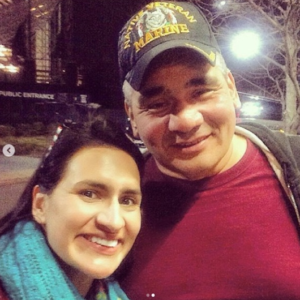
- Details
- By Rich Tupica
ST. PAUL, Minn. — In an Instagram message posted yesterday, Minnesota Lt. Gov. Peggy Flanagan, a citizen of the White Earth Nation of Ojibwe, announced the passing of her brother Ron, who died Saturday following a battle with COVID-19.
The former Marine is Tennessee’s second COVID-related death, and his passing comes two months after the death of their 72-year old father, Minnesota-based White Earth activistMarvin Manypenny.
Her heartfelt tribute honoring her brother — which ends with “THIS is why we must #StayHome” — also gave some back history on her late brother.
“To many, he’ll be a statistic,” she wrote. “But to me, I’ll remember a loving, older brother, uncle, father, and husband.”
In recent weeks, she said her brother was diagnosed with cancer, weakening his immune system. Flanagan said he contracted COVID-19 and was ultimately put on a ventilator and medically induced coma.
"Ron was a tough-as-nails Marine who was a big teddy bear on the inside,” the post read. “He never left my dad’s side during his final weeks and took care of everyone else in the way only he could. His politics didn’t match mine AT ALL (and we joked about it constantly), but Ron was a very good man who had an amazing capacity to love. I miss him dearly.”
More Stories Like This
Native News Weekly (August 25, 2024): D.C. BriefsUS Presidents in Their Own Words Concerning American Indians
Native News Weekly (December 14, 2025): D.C. Briefs
Wounded Knee Massacre Site Protection Bill Passes Congress
Two Murdered on Colville Indian Reservation
Help us defend tribal sovereignty.
At Native News Online, our mission is rooted in telling the stories that strengthen sovereignty and uplift Indigenous voices — not just at year’s end, but every single day.
Because of your generosity last year, we were able to keep our reporters on the ground in tribal communities, at national gatherings and in the halls of Congress — covering the issues that matter most to Indian Country: sovereignty, culture, education, health and economic opportunity.
That support sustained us through a tough year in 2025. Now, as we look to the year ahead, we need your help right now to ensure warrior journalism remains strong — reporting that defends tribal sovereignty, amplifies Native truth, and holds power accountable.
 The stakes couldn't be higher. Your support keeps Native voices heard, Native stories told and Native sovereignty defended.
The stakes couldn't be higher. Your support keeps Native voices heard, Native stories told and Native sovereignty defended.
Stand with Warrior Journalism today.
Levi Rickert (Potawatomi), Editor & Publisher
